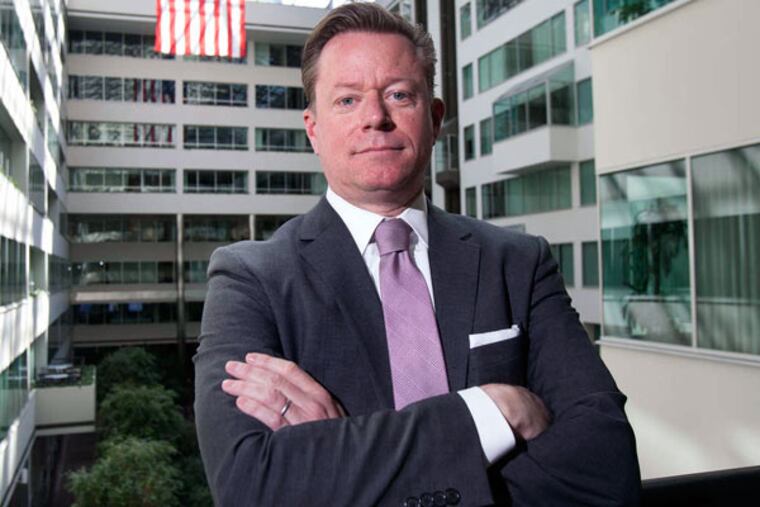City firm presses 9/11 case
Cozen suit, alleging a high Saudi role, has moved in fits and starts for years.

Convicted terrorist Zacarias Moussaoui mentioned it, seemingly as an aside, on the last day of a deposition he gave to lawyers suing the Saudi government for its alleged role in the 9/11 terrorist attacks.
But the point was jarring.
In the late 1990s, Moussaoui said, he met with an employee of the Saudi Embassy in Washington and the two discussed a plan to shoot down Air Force One with a Stinger surface-to-air missile. Moreover, the embassy employee would use diplomatic immunity to smuggle the missile into the United States, Moussaoui said.
By itself, the remarks might seem little more than the idle chatter of a onetime terrorist operative now serving a life sentence in a federal supermax prison in Colorado. But taken together with a longtime pattern of Saudi government support for jihadist movements, the 9/11 lawyers say, Moussaoui's testimony raises disturbing questions about the possible role of Saudi institutions and employees in the attacks.
"The case is about whether Saudi government agents in the United States and elsewhere aided the Sept. 11 hijackers and supported al-Qaeda," said Sean Carter, a partner at the Center City law firm of Cozen O'Connor, who deposed Moussaoui.
"An array of evidence points a strong finger at officials stationed in the Islamic Affairs offices of the Saudi Embassy in Washington, D.C., and the consulate in Los Angeles. If any Saudi official had a role in 9/11, we need and deserve to know about it."
The American lawyers for the government of Saudi Arabia have for years rejected the allegation of government complicity, and in court papers filed last week intensified their criticism of the 9/11 lawsuit. They said the plaintiffs were merely recycling unproven allegations rejected years ago by the first federal District Court judge to hear the case, Richard Conway Casey.
Plaintiffs' filing "does nothing more than rehash unfounded, previously discredited speculation about the alleged role of Saudi Arabia in the terrorist attacks of Sept. 11, 2001," said Washington lawyer Michael Kellogg, who represents the kingdom in the filing. "Despite its great length, the pleading offers only the same grab-bag of rumor and innuendo that Conway rejected 10 years ago."
Moussaoui, sometimes described as the 20th hijacker, was arrested in Minnesota weeks before the 9/11 attacks on an immigration violation, after an instructor at a flight school where he was taking lessons became suspicious.
The lawsuit was filed by Cozen O'Connor in 2003 on behalf of insurers who lost billions in the destruction at ground zero, and it was later merged with other litigation alleging the Saudi government or affiliated institutions had helped fund the emergence of al-Qaeda as a global threat.
Conway dismissed Saudi Arabia as a defendant in 2005. That decision was overturned by the U.S. Court of Appeals for the Second Circuit in Manhattan in December 2013, and Saudi Arabia was reinstated, giving rise to the current litigation battle.
Saudi Arabia once again is seeking to be dropped from the case. No hearing date has been scheduled on that question.
Since the original lawsuit, the Cozen lawyers have sought to add detail to the broad outlines of a 9/11 plot. In the initial lawsuit, they said the emergence of al-Qaeda was fueled in large measure by Saudi government support for Islamist charities that in turn funded the terrorists.
Moussaoui's allegation that he plotted with a Saudi government employee to shoot down Air Force One is important because the Cozen lawyers allege the 9/11 attackers received support from other Saudi government operatives in advance of the attacks.
A central allegation of the lawsuit is that hijackers Nawaf al-Hazmi and Khalid al-Mihdhar met with a Saudi government employee shortly after they arrived in Southern California in February 2000, and that the employee, Omar al-Bayoumi, helped them get settled, finding them an apartment and occasionally paying their rent.
Mihdhar and Hazmi later became part of the five-member team that crashed American Airlines Flight 77 into the Pentagon, after taking off from Washington's Dulles International Airport.
Former Florida Sen. Bob Graham, who chaired the Senate intelligence committee after the attacks, has said that he believes Bayoumi was a Saudi government agent, that he provided assistance to the hijackers, and that he was "acting at the direction of elements of the Saudi government."
Bayoumi also had dealings during this time with an employee of the Saudi Consulate in Los Angeles named Fahad al-Thumairy, who was later expelled from the United States.
A central claim in the 9/11 lawsuit is that Saudi radicals with diplomatic credentials helped promote al-Qaeda's jihadist goals in the U.S. and abroad. Some 16 employees of the Saudi Embassy in Washington, who worked in the ministry of Islamic affairs, were expelled from the U.S. in 2003, the lawsuit points out.
The latest filings in the lawsuit also cite an FBI analysis of Bayoumi's phone records, which show that he made dozens of telephone calls to the Saudi Embassy in Washington, the Saudi Consulate in Los Angeles, and other Saudi entities from January through March of 2000, around the time Bayoumi was helping Hazmi and Mihdhar get settled in San Diego.
215-854-5957 @cmondics